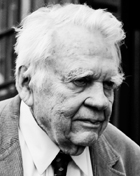
I know a film history buff who knows the life story of nearly every Hollywood legend honored during the annual “In Memoriam” segment during the Academy Awards. He knows more about Ernest Borgnine than most people know about their own grandparents.
“What about all the ‘unfamous’ people who pass away every day?” I frequently joke. But when I found out Andy Rooney died over the weekend, I was unexpectedly saddened, and felt immediately guilty about ribbing my friend for his nostalgia.
Yes, I have a special fondness for journalists, but Rooney was 92 and by all accounts led an active, healthy, rich and professionally fulfilling life — not unlike many of the residents McKnight’s readers serve every day. So why was I torn up over the loss of a man widely agreed to be America’s No. 1 Curmudgeon?
For me, Andy Rooney represents my fondest thoughts about my own grandfather. He died in 2005 at the age of 87 from congestive heart failure, after bouncing back and forth between his home, the hospital and, finally, a nursing home.
Like Rooney, my grandfather, “Gus,” flew in B-17s in World War II; Rooney was in the European theater, while my grandfather flew in the South Pacific. My grandfather survived Pearl Harbor, then went on to be a waist gunner in a Flying Fortress in the battles of Midway, Guadalcanal and the Solomons, among others. When healthy, he lived to attend his regular bomber group and Pearl Harbor survivor reunions. In the last weeks of his life, he talked more about the war than any other topic, often tearfully, as if it happened only yesterday.
Rooney worked as a journalist for the “Stars and Stripes” during the war. When I remember Andy Rooney, I try not to think of him as the Grumpy Gus he became famous for, in his editorials on “60 Minutes,” but as the reporter who earned comparisons to journalist Ernie Pyle and editorial cartoonist Bill Mauldin (whose works my grandfather also loved). I would argue that some of the letters my grandfather wrote from the South Pacific were just as poetic and honest as Rooney’s dispatches.
The two men will remain inextricably linked in my mind for several reasons. For starters, both resisted aging and both refused to retire. My grandfather worked at the family hardware store he owned every day until heart failure caught up with him at age 86. He took an occasional afternoon off, but even then he worked in the garden and mowed his own lawn.
Rooney only very recently retired from “60 Minutes” famously saying “writers never retire.”
While attending the LeadingAge Annual Meeting in Washington last month, I was bound and determined to make a trek down to the WWII memorial, the only memorial in Washington I’ve never seen. I’ve always been sad that my grandfather didn’t live to see its completion. But I ran out of time.
I marveled at the loving care my grandfather received at his nursing home during the last days and hours of his life, how the nurses didn’t flinch when treating him for c. diff and how unfazed they were when he grumbled about not being able to get his meds for free from the VA hospital 20 miles away.
My grandfather was my dad’s father, yet I found it so touching how at ease my mom was in my grandfather’s final hours in the local hospital’s ICU. My mom is a nurse, who also has worked in long-term care. I’m always amazed by how matter-of-fact and comfortable nurses are of death and the aging process in general. The rest of us should be so lucky.
I like to imagine that if my grandfather were to meet Andy Rooney in person, they would immediately hit it off. My grandfather would complain about minivan drivers, Rooney would mutter about the amount of peanuts in canisters marked “mixed nuts.” Then they’d have a beer and trade B-17 stories.




